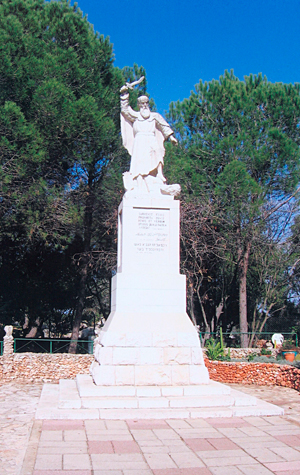For all of his preeminence among the prophets of Israel (he and Moses joined Jesus on the Mount of Transfiguration), Elijah remains a puzzling figure who lived an amazing life of faith and obedience, but also was prone to self-pity and fear.
 Statue of Elijah on Mount Carmel.
Statue of Elijah on Mount Carmel.Atop Mount Carmel in Haifa, Israel’s third largest city and most important port, I stood at the revered site of one of the most dramatic confrontations in Old Testament history, a defining moment which left the people proclaiming, “The Lord is God; the Lord alone is God” (Good News Translation).
The drama was played out in 1 Kings 18, but the stage was set in chapters 16 and 17 when God dried up the land ruled over by King Ahab, who “did more to arouse the anger of the Lord, the God of Israel, than all the kings of Israel before him” by establishing the worship of the pagan gods Baal and Asherah after his marriage to Jezebel.
As for Elijah, little is known about him other than his place of origin (he was from Tishbe in Gilead) until he emerged on the scene during the 22-year reign of King Ahab from approximately 874 to 852 B.C., and declared to the king that neither dew nor rain would fall on Israel for the next two or three years — or “until I say so.”
During the third year of the drought, Elijah paid another visit to King Ahab to deliver a promise of rain, which started a chain of events that ended with the confrontation on Mount Carmel between the prophet of the Lord, whom Ahab called “the worst troublemaker in Israel,” and hundreds of pagan prophets of Baal and Asherah.
According to 1 Kings 18:20-40, a supernatural demonstration of power by God through his prophet Elijah led the people of Israel, who had assembled for the event, to abandon their idolatry and turn again to the Lord. Elijah then ordered the people to “seize the prophets of Baal,” and they were killed down in the Kishon Brook.
God then ended his punishment of Israel by sending rain.
Whatever elation Elijah felt at the momentous victory by his Lord over the pagan gods was short-lived, however.
The story is continued in 1 Kings 19. When Jezebel learned that Elijah bore responsibility for the deaths of her beloved pagan priests of Baal, she wanted Elijah killed as well. And Elijah “was afraid and fled for his life” to Beersheba in Judah and hid in despair. An angel ministered to him there, and then Elijah traveled 40 miles to Horeb, sat down in the shade of a tree and wished to die. “It’s too much, Lord,” he prayed. “Take away my life; I might as well be dead.”
Of course, Elijah recovered from his bout of despair and carried out his ministry, which included the anointment of Hazael as king over Syria and Jehu as king of Israel. And, as directed by God, Elijah found and commissioned Elisha, who became his assistant and later his successor when Elijah, according to 2 Kings 2: 11-15, was whisked away on a “chariot of fire.”
Atop Mount Carmel stands a larger-than-life statue of the prophet Elijah, wielding a sword and bearing a look of fierce anger and determination on his face.
By the time of Jesus, the faithful regarded Elijah as the embodiment of the Old Testament’s ministry of prophecy, in much the same way that believers looked at Moses in relation to the law.
In the New Testament, James cited Elijah as the model of faithfulness and of the power of prayer (5:17).
And yet, as I looked at that statue of Elijah, at an image of strength set in stone, I could not help but think about this great prophet in the immediate aftermath of his victorious confrontation with the priests of Baal as he ran for his life in fear, sulked in self-pity and gave in to despair.
As I rode down from the peak of that sacred site in Old Testament history with my editor colleagues, I thought about what I had just seen and felt, and I realized anew that we as Christians cannot dwell forever — and sometimes not even for long — on spiritual mountaintops of our lives. You and I, as did Elijah, must contend with the “downs” as well as the “ups” of our journeys of faith. Often, the “downs” come swiftly on the heels of the “ups” — as was Elijah’s experience. But the Lord lifted Elijah up. There was more work to do. And God will lift us up as well, for we, too, have more work to do for our Lord.